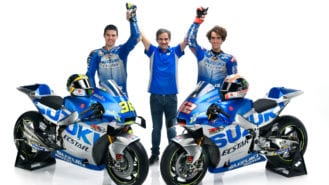De Meo clearly felt more comfortable making his own appointment for the job of guiding the Alpine team’s F1 programme than retaining the appointee of the previous regime, especially given the unsatisfactory progress of the team in the previous few years. All seemed set for Brivio to be announced as the new team boss, with Abiteboul moving up to that corporate role De Meo had envisaged for him. But at the 11th hour Abiteboul announced he would not be taking up the job – and that he was leaving the company. It is said he wished to still be in charge of the F1 team within the corporate role but that this was not accepted by De Meo. It would be no surprise to see Abiteboul recruited by Tavares and turning up within the expanded Peugeot group – which has competition programmes with Peugeot (Le Mans from 2022), Citroën (a rumoured return to the WRC) and Alfa Romeo (title sponsor of Sauber in F1).
A couple of weeks after Abiteboul dropped his bombshell, the former Stoll role was announced as being filled by Laurent Rossi, a Renault automotive internal appointment. But closer to the coalface of the F1 team, the differing visions of Abiteboul and De Meo also brought a problem: Abiteboul had planned around making the team’s executive director Marcin Budkowski team principal as Abiteboul moved to the senior Alpine role. But now there appeared to be two competing candidates for that team principal job – Budkowski and Brivio, and the latter had already departed Suzuki. A way needed to be found to accommodate both in positions which respected their ambitions and commitments made to them.
Brivio was subsequently announced as racing director – reporting direct to Rossi (i.e. not to Budkowski). But the ambiguousness of the situation created by Abiteboul’s departure was reflected within the statement by the sentence, “[Brivio’s] specific role and responsibilities will be announced in the coming weeks.” If, as expected, Budkowski becomes team principal, there has effectively been another layer of management created.
The challenge for the team will be in preventing the volatile corporate environment from impacting upon its operation and to keep everyone motivated despite the uncertainty at the corporate level. Getting the right group of people in place, then providing a stable working environment has been proven to be the key to F1 success. If Alpine is to flourish, it needs to put this management upheaval to bed as soon as possible – especially with the arrival of Fernando Alonso, who will likely be blunt in his assessment of any shortcomings.
Brivio’s reputation from MotoGP is having great personal skills. That is going to be put to the test now and in a team with about 10 times the number of employees as those of a MotoGP outfit. He’s going to need the support and co-operation of those who are already there if the whole thing is to fly.
Since he began covering grand prix racing in 2000, Mark Hughes has forged a reputation as the finest Formula 1 analyst of his generation
Follow Mark on Twitter @SportmphMark

